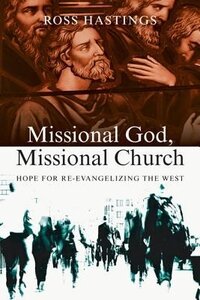Ross Hastings, Missional God, Missional Church: Hope for Evangelizing the West. IVP Academic, 2012.
Referenced in:
- Missional Communities — Convergent with Conventional
- Theology of Mission, Proposals and Formulations — Convergent with Conventional
LifeandLeadership.com Summary
Hastings offers a theology of mission that is respectful of the Deep Church emphasis forwarded by writers such as Jim Belcher, Liederbach and Reid, as well as Andrew Walker and Luke Bretherton. I have placed these writings in a Convergent With Conventional category, in that they try to affirm the value of Emergent while respecting the historic theological roots of the traditional church.
Hastings, like Belcher and Liederbach/Reid, is a substantive theological work. His emphasis, which is shared by the Deep Church authors, but which is emphasized more strongly here, is that the missional church should be both deep and wide. His biblical basis is the high-priestly prayer in John 20, affirming
“that the church that is deeply intimate with the triune missional God cannot fail to be intentionally and widely influential in all aspects of mission, the mission of fulfilling the cultural mandate that calls us to be fully human in all aspects of human life-marriage, family, vocation (Gen 1-2); the mission of loving our neighbors (Mt 22) through acts of compassion and justice seeking, because we love the God who created them and has in Christ reconciled the world to himself; and the mission to evangelize and make disciples of all nations (Mk 16; Mt 28).”
In the language of the current literature, the “missional church is a term that, if properly understood to mean that the church is both centrifugal (sending out) and centripetal (bringing in).” He expands,
For those who stress the “sentness” aspect of the missional approach to an extent that any concept of a gathered church with a deep inner life is neglected, or who promote the idea that meetings with seekers at Starbucks constitutes the church, I wish to offer the corrective that to be truly missional in participation with the missional God means acknowledging that there is a bringing dimension to the nature and mission of God, and that therefore there ought to be a concomitant bringing (centripetal as well as centrifugal) or gathering dimension to the life of the church. What I offer here is a theology of the church that is, in a nutshell, participational, that its missional identity is an organic consequence of union in and participation with the missional God, who is bidirectional in His missional nature. He both sends and brings. The church in union with God will therefore be a bidirectional, a sending and a bringing church. It will gather to press into that union. It will therefore as gathered be a missional presence in the world and a priesthood representing humanity to God. Its outgoing mission as the scattered church is also a participation in the ongoing mission on earth that Christ began and then entrusted his people to finish (Jn 20:21; Acts 1:1). Its task is not to do mission but to join God in what he by the Spirit is already doing. It must be deep and it will be wide in its character as the missional church participating in the life and love of its Head. Its deep and wide missional identity is the only hope for the re-evangelization of the West.
This is a kind of “missional width and spiritual depth, openness to the world and integrity of the church, cultural relevance and confessional rootedness in the grand narrative of the Christian tradition and historic orthodoxy, openness to the surprising new works of the Spirit and a catholicity that reflects the depth of a liturgical and sacramental tradition.”
Publisher’s Description
“As the Father has sent me, I am sending you” (John 20:21).
With the reality of broad-scale secularization in the West and the attendant cloud of insignificance hanging over the church, is there any hope for the re-evangelization of the West?
In this comprehensive theology of mission, Ross Hastings directs the fretful gaze of the church to the trinitarian commission of John 20. There we find Jesus granting peace to his disciples by breathing his Spirit on them. He formed them into his community of shalom. Leaving their locked room, these “sent ones” went out to participate in God’s own ongoing mission to the world.
Hastings also tackles the dual challenges of isolation from and accommodation to the surrounding culture. Building on the works of David Bosch, Lesslie Newbigin, Christopher Wright and Darrell Guder, the author corrects numerous dichotomies that hinder the church. In the power of the Spirit the gathered church is spiritually transformed and also scattered as it proclaims God’s forgiveness and freedom.
This comprehensive theology of mission opens possibilities for renewal of faithful effort as we join in Christ’s mission to the world.
About the Author
Ross Hastings is associate professor of pastoral theology at Regent College. Hastings holds two Ph.Ds, one in chemistry from Queen’s University in Kingston Ontario, and the other in theology from the University of St. Andrews in Scotland. From 1992 to 1995 he served as a pastor in Montreal before returning to British Columbia to become the senior pastor of Peace Portal Alliance Church. Hastings also previously served as a sessional lecturer for two years at Regent College, teaching in the area of pastoral ethics. He is an ordained minister with the Christian and Missionary Alliance and a much sought-after conference speaker. Widely published in the fields of chemistry and theology, his primary interestes are in Trinitarian theology and the practice of ministry and mission, pneumatology, the development of missional churches, theological ethics, and the interface between theology and science.
**For additional information on this resource, including reviews, click the bookstore links. Check the reference at page top for resource guides on related topics.***
—
See Resources on Over 100 Areas of Christian Ministry:


